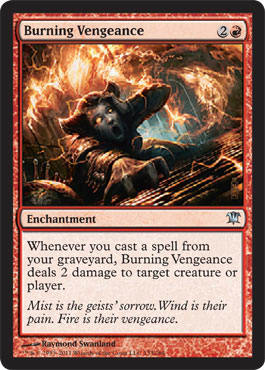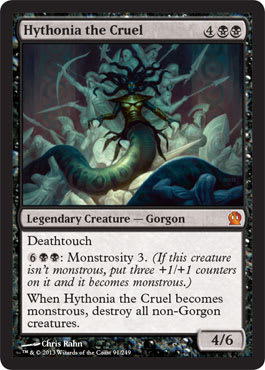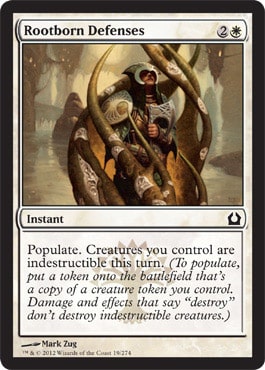This is my 101st budget deck-building article here on Gathering Magic. Over the last few years, I've given you a hundred different deck ideas. Today, I'm going to help you make your own. Building a deck on a budget can be difficult, but by considering these rules and strategies, you can be crushing Friday Night Magic in no time.
Know Your Limits
One very common mistake I see among people who try to build on a budget is that they do it backward. They start by building a deck, and they then look at their budget at see how they can make that deck cheaper. This is very wrong. Figuring out what your budget is should be the first thing you do. Then, you need to keep that in mind from the very start of deck-building.
It's best to stay away from making powered-down versions of decks. Instead, build a deck that's inherently less expensive. For example, a fully-powered white weenie deck will usually serve you far better than a budgetized version of Jund.
If you're working with a budget of $20 or $30, you're going to want to stick to commons and uncommons almost exclusively. Aggro decks are usually your best bet here, as most efficient early creatures and removal spells are found below rare.
If you have higher budget, say $60, you can rely on rares a bit more, although you'll still want to avoid expensive format staples. Including a $5 or $6 rare can be a very good investment, but you don't want to blow your whole budget on Mutavaults.
Find Diamonds in the Rough
This is the core of budget deck-building. Find a powerful card that hasn't yet found its place in Standard. Any set will have some rares that are just short of being good enough for competitive play. These will be your most powerful weapons. For example, Desecration Demon was a card that fell into this area until recently, and I took advantage of it in a number of decks. It was always a good card, but only recently has it become good enough for high-level players to take notice. Finding these cards that haven't quite broken through yet will put you off to a great start.
Tools like Gatherer and MagicCards.info are great for finding these cards. With them, you can easily comb through every rare in Standard. You can be reminded of forgotten gems from last year or discover new cards that haven't seen the spotlight yet. There are always a few things that have been overlooked by the community at large.
In addition, don't forget to take a close look at the uncommons. There are often some very powerful cards hiding in there. Most sets these days include a few build-around uncommons for Draft purposes, and you can frequently use these to your advantage when building a Standard deck.
Use Synergy
This is my favorite tool for building budget decks. Whereas more expensive decks can get away with simply playing a pile of powerful cards, a budget deck needs something else to give it an edge. Rather than playing all good cards, you can use cards that are bad on their own but that become far more powerful in a deck built to take advantage of them.
The downside to this plan is that it's generally more fragile. You might be stymied by decks packing a large amount of disruption or you might simply have more bad draws where the deck can't really do its thing. On the other hand, when things do come together, you'll often have a game plan that's far more powerful than anything the competitive decks can dish out.
Respect the Best Decks
The best decks are considered the best for a reason. They're the most consistently powerful decks in the current format. To beat them, you'll usually need to give up something to gain an edge. The synergy plan, for example, gives up some consistency for extra power, letting you overcome better decks with brute force.
Another strategy you can use is the metagame call. Even the best decks have weaknesses, and you can build something specifically geared to beat one or two of them. This lets you consistently crush a certain portion of the field. What you usually give up, however, is your win rate against other decks. By designing your deck with beating one strategy in mind, you often create or amplify weaknesses in your deck that others can exploit. If the best deck is control, and you build something to crush it, the second-best deck, an aggro list, might become very difficult to beat.
Have a Plan
Even if you're not using the synergy approach, you need to have a solid game plan. Too often, I see players mix and match different game plans within one deck. They start off with an aggressive curve of 1-drops and 2-drops, and they then keep going all the way up to the pair of 6-mana monsters they included “for the late game.” When you are using this approach, the faster decks will have a far better early game than you, the midrange decks will blow you out in the midgame, and control decks will wear you down easily later in the game. By making your deck good at each stage of the game, you make it great at none of them.
Instead, you need to have a specific plan of how the game is going to play out. If you're going to rush your opponent with early creatures and win before he can stop you, do that, and keep the 6-drops far away. If you're going to ramp into giant creatures, I don't want to see a bunch of 1-drops that don't accelerate your mana. If you're going to play control and stop your opponent's every move, that powerful midrange creature doesn't belong.
This is pretty basic deck-building advice, but it becomes even more important when building on a budget. With limited resources, you need to keep things as focused and powerful as possible if you want to have a chance of winning.
Have Anti-Trumps
When playing a budget deck, most of your opponents will have cards that are just plain better than yours. You need ways to deal with those. Removal spells are the most common way to do this. If your opponent plays a creature that's better than anything you have, you can kill it and move on. Spells that return creatures to their owners' hands or prevent them from blocking also work.
Counterspells also work quite nicely. They can deal with powerful creatures, but they have the additional advantage of being able to stop game-breaking spells. You can also take advantage of pseudo-counterspells if you're trying to stop one specific kind of card. For example, if you're worried about board wipes, Rootborn Defenses is a pseudo-counter that will let you pretend that Supreme Verdict never happened. If you're concerned about removal, Gods Willing can give your creature protection from the appropriate color to counter the spell on resolution.
Practice
Finally, the best thing you can do is practice with the deck. Test it extensively, make changes, and really give it a proper tuning. Furthermore, know how it plays against the decks you can expect to face in the current Standard environment. One advantage of playing a rogue deck is that your opponent has no idea what you're doing or how the game will play out. Make sure that advantage is yours alone.
When playing against one of the current best decks, you can probably guess the list within a few cards if you've done your homework. You know what to expect and what to play around. By playing something unexpected, you take that ability away from your opponent. He doesn't know what removal spells you have or what creature you might be running out next. Having this one-sided advantage can push you toward victory against even the toughest decks.
After all, knowing is half the battle.
The other half is good deck-building.



























